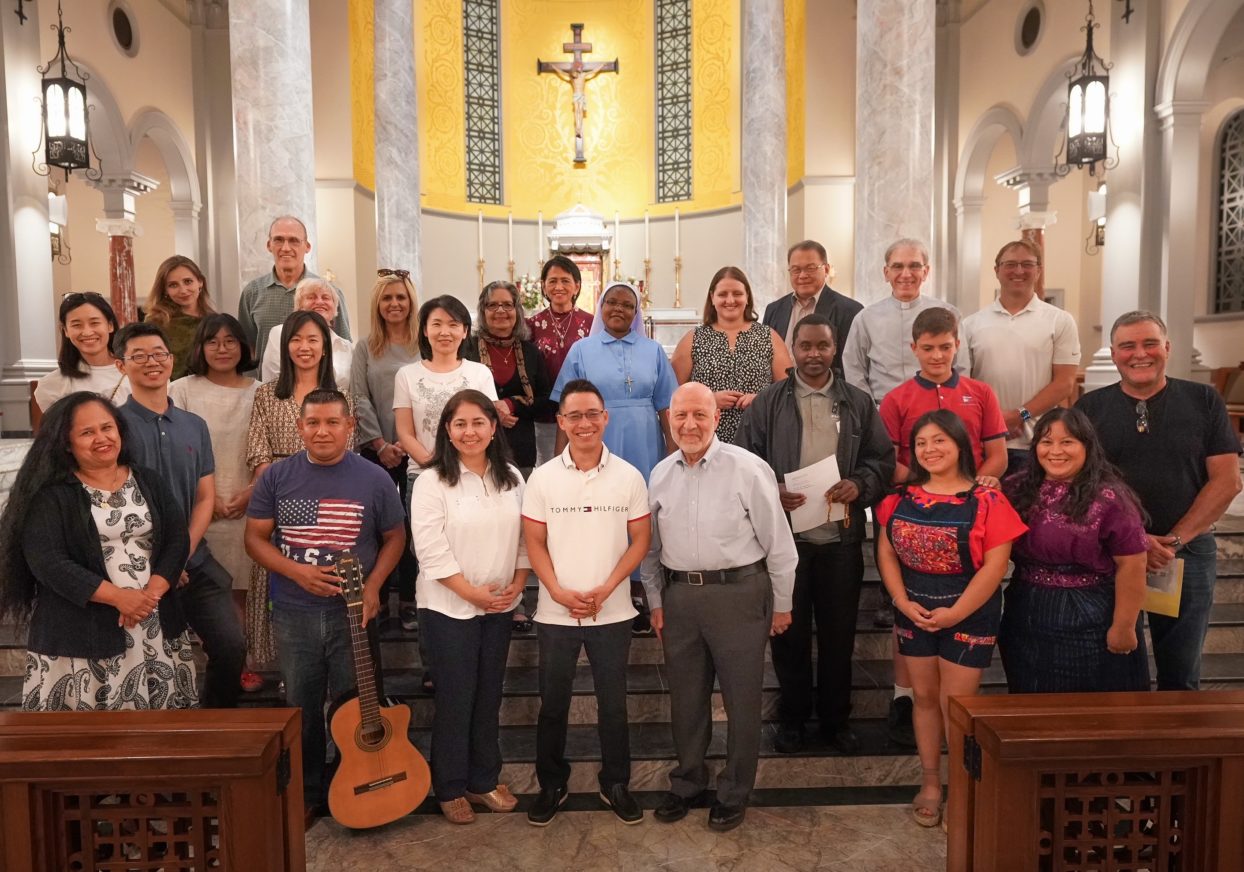By Bill Brewer
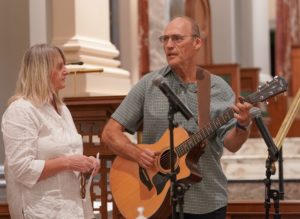 Catholics from different nationalities whose common denominator is East Tennessee congregated for a multicultural rosary on Sept. 23 at the Cathedral of the Most Sacred Heart of Jesus to commemorate National Migration Week and World Day of Migrants and Refugees.
Catholics from different nationalities whose common denominator is East Tennessee congregated for a multicultural rosary on Sept. 23 at the Cathedral of the Most Sacred Heart of Jesus to commemorate National Migration Week and World Day of Migrants and Refugees.
It was the second annual multicultural rosary in the Diocese of Knoxville, a sacred service that Blanca Primm hopes will become an annual occurrence. The rosary was followed by an international food celebration at the Chancery.
The World Day of Migrants and Refugees is recognized annually on the last Sunday of September, which was Sept. 25 this year. According to the U.S. Conference of Catholic Bishops, the Church has been celebrating World Day of Migrants and Refugees since 1914.
The celebration is fairly new in the Diocese of Knoxville.
“We started this tradition last year. There is a special beauty and joy in bringing together the body of Christ made up of its diverse members who make up His Church. It was beautiful to see representatives of the different ethnic and cultural communities of the Knoxville area present with the dream of praying together to ask for the intercession of our beloved Mother Mary, especially for those individuals and families who are forced to leave their homes in search of a better and more secure life for their future,” said Mrs. Primm, director of Hispanic Ministry for the Diocese of Knoxville and organizer of the multicultural rosary.
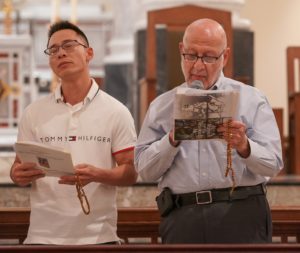 “The idea for the rosary came because there are not only Hispanics but many immigrants in the Diocese of Knoxville. And we wanted to celebrate our diversity and being united through our faith,” Mrs. Primm added. “We do this by praying through the intercession of our Blessed Mother for all the immigrants and refugees. In the context of that week, many of our Haitian brothers and sisters are struggling in Mexico and Guatemala after leaving their country on the way to the United States. We especially pray for them, too, for their lives and their journeys as they move to find a better way of life.”
“The idea for the rosary came because there are not only Hispanics but many immigrants in the Diocese of Knoxville. And we wanted to celebrate our diversity and being united through our faith,” Mrs. Primm added. “We do this by praying through the intercession of our Blessed Mother for all the immigrants and refugees. In the context of that week, many of our Haitian brothers and sisters are struggling in Mexico and Guatemala after leaving their country on the way to the United States. We especially pray for them, too, for their lives and their journeys as they move to find a better way of life.”
Each mystery, prayer, and intention was said in a different language, with 14 languages represented at the rosary, according to Mrs. Primm. In 2021, the multilingual rosary also was prayed in 14 languages.
She said the languages spoken in the 2022 multilingual rosary were English, Spanish, Tagalog, Italian, Swahili, Korean, Polish, the Mayan dialect of Akateco, French, German, Portuguese, Arabic, Vietnamese, Korean, and Latin.
Some 150 people participated in the rosary, with all who attended receiving a rosary blessed by Cardinal Justin Rigali.
Mrs. Primm noted that between the recitation of the rosary decades, songs from the Polish and Korean communities were sung as were songs in Spanish and English.
“All the songs expressed the longing for an encounter with the Lord, our common Father, and our identity as a human family, members of one Church,” she said.
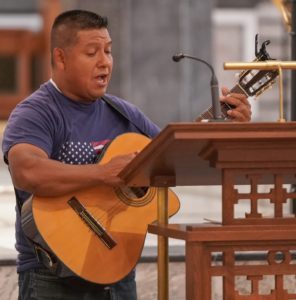 A number of the prayers were for God to heal the current woes of the world.
A number of the prayers were for God to heal the current woes of the world.
“We also pray for young people with DACA (Deferred Action for Childhood Arrivals), for an end to the war between Ukraine and Russia, and for an end to the persecution of the Catholic Church in Nicaragua, Africa, and the Middle East. We also prayed that the governments of each country work for the common good and respect human dignity from conception to natural death, and for all migrants who have died trying to cross the border, so that these deaths do not ever happen again. We also especially prayed for children traveling without the company of safe adults or their parents, and for the reunification of their families and for their safety,” Mrs. Primm said.
She explained that prayers and reflections also had a local tie during the rosary.
“Before beginning the rosary, Deacon Rafael Pubillones from St. Thomas the Apostle Parish in Lenoir City gave a reflection in English and Spanish on immigration. He, like many of those present, is also an immigrant, and together with his family was forced to leave communist Cuba when he was very young, going through much suffering and discomfort,” Mrs. Primm said.
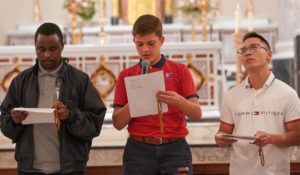 “He stressed that as disciples of Christ and members of the Church we need to go out to meet our immigrant brothers and sisters regardless of their immigration status, and he shared the following biblical passage from Isaiah 61: ‘The Spirit of the Lord Yahweh is upon me, because he has anointed me. He has sent me to announce the good news to the poor, to bind up broken hearts; to proclaim liberation to captives and liberty to prisoners; to proclaim a year of grace from Yahweh, a day of vengeance from our God to console all those who mourn,’” she continued.
“He stressed that as disciples of Christ and members of the Church we need to go out to meet our immigrant brothers and sisters regardless of their immigration status, and he shared the following biblical passage from Isaiah 61: ‘The Spirit of the Lord Yahweh is upon me, because he has anointed me. He has sent me to announce the good news to the poor, to bind up broken hearts; to proclaim liberation to captives and liberty to prisoners; to proclaim a year of grace from Yahweh, a day of vengeance from our God to console all those who mourn,’” she continued.
In his reflections, Deacon Pubillones prayed for the intercession of St. Frances Xavier Cabrini, the patron saint of immigrants.
The multicultural rosary is very meaningful for Kasia Golec because it allows participants to witness God’s diversity in the Church in East Tennessee.
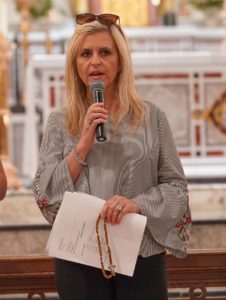 Ms. Golec, a parishioner at the Cathedral of the Most Sacred Heart of Jesus, has been active in organizing the Polish Catholic community in the Diocese of Knoxville. The cathedral hosts a monthly Polish Mass celebrated by Father Martin Gładysz and Bishop Richard F. Stika.
Ms. Golec, a parishioner at the Cathedral of the Most Sacred Heart of Jesus, has been active in organizing the Polish Catholic community in the Diocese of Knoxville. The cathedral hosts a monthly Polish Mass celebrated by Father Martin Gładysz and Bishop Richard F. Stika.
“It was so great to take a break from our busy lives and get together to pray the multilingual rosary and meditate on the mysteries in so many languages. Praying the rosary helps re-orientate ourselves to Christ, who can lift us out of ourselves and our sin, and teaches us again and again how important it is to love our brothers and sisters regardless of the nationality or the language they speak,” Ms. Golec said.
Bernard Nsengiyaremye of Holy Ghost Parish was among those taking part in the multicultural rosary. He regularly attends the Swahili Mass at Holy Ghost.
Mr. Nsengiyaremye was as spiritually uplifted to be able to pray in his native African language, Swahili, as others prayed in their native languages as he is at the monthly Swahili Masses at Holy Ghost.
“I’m overjoyed to have that moment again in life to pray to God in my own language. You can feel a deep sense of communicating with the Lord in your own language. And you can feel that you are not alone. It meant so much to me to participate in the multilingual rosary. It reminded me of being home praying to Jesus like a child talking to his or her own mother,” Mr. Nsengiyaremye said.
“Saying the rosary in multiple languages gave me the sense of the Holy Spirit at work. It was an inspiration among believers. When a child talks to his or her mother, he is sure that the mother understands very well the need of the child, and there’s no stressful moment. It was the same for the multilingual rosary,” he further said.
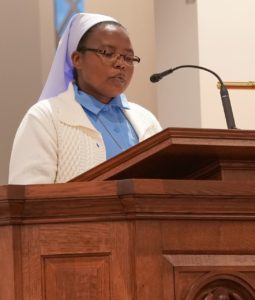 Dr. Al Hazari and his wife, Marcelle, shared Mr. Nsengiyaremye’s feelings.
Dr. Al Hazari and his wife, Marcelle, shared Mr. Nsengiyaremye’s feelings.
“The multilingual rosary was very spirit-filled. My wife, Marcelle, and I felt that we were present there witnessing the day of Pentecost when everyone was speaking in tongues,” said Dr. Hazari, a retired University of Tennessee chemistry professor and a native of Lebanon in the Middle East.
The diocesan celebration of immigrants and refugees continued after the rosary as food from the different countries was on display at the Chancery for all to enjoy.
Mrs. Primm said the fellowship was an important aspect in recognizing National Migration Week and World Day of Migrants and Refugees.
“At the end of the rosary, we gathered at the Chancery of the diocese to share delicious meals from the countries represented. We shared conversations that allowed us to strengthen the bond between us. It was a festival of color and flavor, but especially of love between brethren in faith,” she said. “We invite you next year, so that, God willing, you can participate in this prayer for all the immigrants of the world in this great celebration of unity and diversity in the Catholic Church of the Diocese of Knoxville. If you wish to pray this rosary in other parts of the diocese, you can contact us to coordinate this effort.”
The Office of Hispanic Ministry can be reached at dioknox.org/apostoladohispano, 865-584-3307, or bprimm@dioknox.org.

